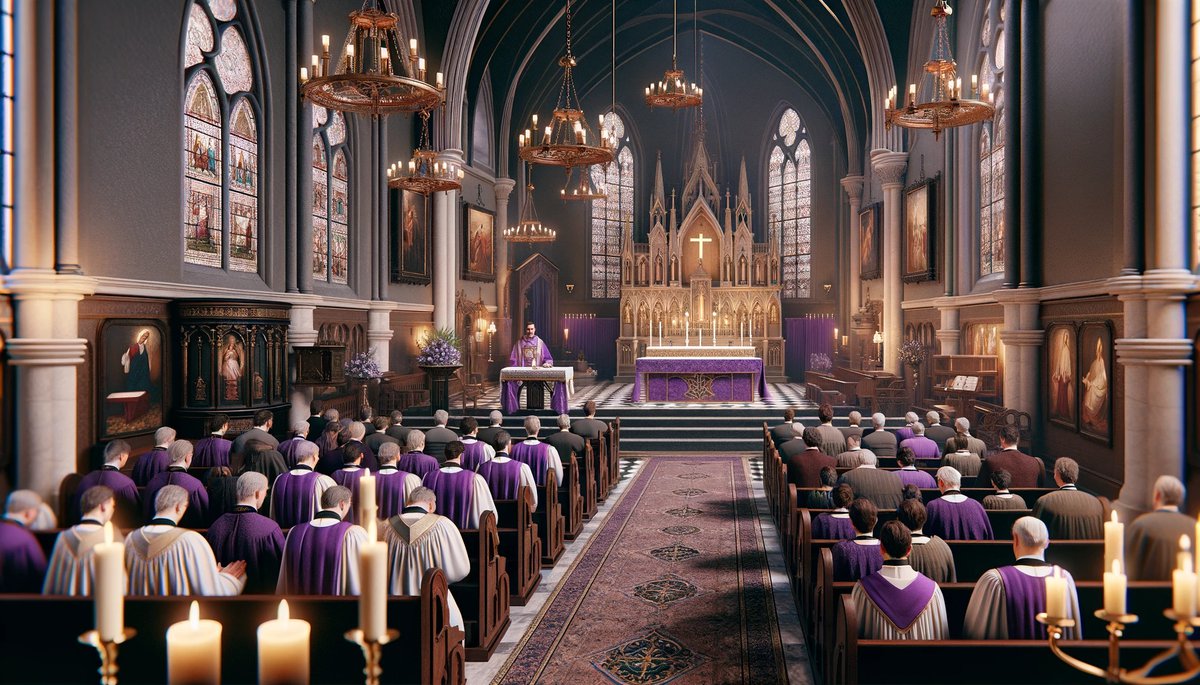Home>Special Themes>Why Do We Celebrate Advent?


Special Themes
Why Do We Celebrate Advent?
Published: February 12, 2024
Jason DeRose, Managing Editor at Christian.net, uses his expertise in religion and journalism to deepen understanding of faith's societal impacts. His editorial leadership, coupled with a strong academic background, enriches the platform’s diverse content, earning him recognition in both journalism and religious circles.
Discover the significance and traditions of Advent, a special time of preparation and anticipation in the Christian calendar. Learn why we celebrate Advent and its themes.
(Many of the links in this article redirect to a specific reviewed product. Your purchase of these products through affiliate links helps to generate commission for Christian.net, at no extra cost. Learn more)
Table of Contents
Introduction
Advent is a time of joyful anticipation and spiritual preparation observed by millions of people around the world. As the holiday season approaches, the tradition of celebrating Advent holds a special place in the hearts of many. It marks the beginning of the liturgical year in Western Christianity and is a period of expectant waiting and preparation for the celebration of the birth of Jesus Christ at Christmas.
The word "Advent" is derived from the Latin word "adventus," which means "coming" or "arrival." It symbolizes the coming of Christ into the world and serves as a reminder of the hope and promise that Jesus brings to humanity. This sacred season typically begins on the fourth Sunday before Christmas and lasts until Christmas Eve, encompassing a span of four weeks.
During Advent, believers reflect on the significance of Christ's birth and look forward to his second coming. It is a time of spiritual reflection, prayer, and contemplation, as individuals and communities prepare their hearts to welcome the light of Christ into their lives.
The observance of Advent is characterized by various customs and traditions, including the lighting of Advent candles, the use of an Advent wreath, and the singing of hymns and carols that capture the spirit of anticipation and hope. These practices serve as poignant reminders of the profound meaning behind the season and foster a sense of unity and shared faith among participants.
As we delve deeper into the history, meaning, and traditions of Advent, we will uncover the rich tapestry of beliefs and customs that have been woven into this cherished observance. Join us on a journey to explore the origins and significance of Advent, and discover why it continues to hold a special place in the hearts of believers worldwide.
Read more: What Do We Celebrate On Advent
The History of Advent
The history of Advent can be traced back to the early centuries of Christianity, with its roots firmly embedded in the traditions of the Western Church. The origins of this sacred observance can be found in the practices of early Christians who sought to prepare themselves for the celebration of the birth of Jesus Christ.
The earliest recorded evidence of a pre-Christmas season of preparation dates back to the 4th and 5th centuries in Gaul (modern-day France). During this time, Christians engaged in a period of fasting and penitence leading up to the feast of the Nativity. This preparatory period, known as "St. Martin's Lent," was observed for 40 days and mirrored the Lenten season preceding Easter.
Over time, the duration of this preparatory period varied, with different regions adopting distinct customs and practices. In the 6th century, the Council of Tours established the "fast before Christmas" as a time of spiritual reflection and penance, further solidifying the significance of this season within the Church calendar.
The liturgical structure of Advent as a four-week period began to take shape in the medieval period, with the introduction of the Advent wreath and the use of Advent candles. These symbolic elements served as visual reminders of the gradual approach of Christmas and the increasing anticipation of Christ's birth.
The themes of Advent, including hope, peace, joy, and love, became more pronounced during the Middle Ages, as the Church incorporated these concepts into the liturgical readings and prayers of the season. The evolving symbolism and spiritual significance of Advent contributed to its widespread adoption and enduring relevance within Christian communities.
In the 20th century, the observance of Advent experienced a revival, as various Christian denominations embraced its traditions and adapted them to contemporary worship practices. Today, Advent continues to be a cherished and integral part of the Christian liturgical year, resonating with believers as a time of spiritual preparation, joyful expectation, and hopeful anticipation.
The history of Advent reflects the enduring legacy of faith and devotion that has been passed down through generations, shaping the way in which Christians approach the celebration of Christ's birth. This rich tapestry of tradition and spirituality continues to inspire and unite believers as they journey through the season of Advent, drawing strength from the timeless message of hope and salvation heralded by the coming of Christ.
The Meaning of Advent
Advent holds profound significance within the Christian faith, encapsulating a multifaceted tapestry of spiritual themes and theological depth. At its core, Advent represents a period of expectant waiting and preparation for the celebration of the birth of Jesus Christ at Christmas. This sacred season serves as a poignant reminder of the hope, joy, and promise that Christ's arrival brings to humanity, transcending time and space to touch the hearts of believers across generations.
The essence of Advent is intricately woven with the themes of anticipation, longing, and divine fulfillment. It beckons believers to engage in a journey of introspection and spiritual readiness, as they await the coming of the Messiah with eager hearts and open minds. The four-week duration of Advent symbolizes the unfolding of salvation history, inviting individuals to immerse themselves in the timeless narrative of God's redemptive plan for humanity.
Central to the meaning of Advent are the four traditional themes represented by the lighting of the Advent wreath candles: hope, peace, joy, and love. These emblematic concepts encapsulate the essence of the season, guiding believers on a transformative path of spiritual contemplation and renewal. Each week, as a new candle is lit, the luminous glow serves as a beacon of faith, illuminating the path toward the celebration of Christ's birth and the dawning of a new era of salvation.
Moreover, Advent embodies a sense of profound longing and anticipation, echoing the sentiments of ancient prophecies and the collective yearning of humanity for divine intervention. It encapsulates the anticipation of the fulfillment of God's promises, as foretold by the prophets of old and realized in the birth of Jesus Christ. This sense of expectancy infuses the season with a palpable sense of hope and renewal, inspiring believers to embrace the transformative power of Christ's coming into the world.
In essence, the meaning of Advent transcends mere temporal observance, inviting believers to embark on a spiritual pilgrimage of the heart. It calls for a deepening of faith, a rekindling of hope, and a reawakening of the soul to the profound significance of Christ's incarnation. Through the timeless symbols, traditions, and liturgical observances of Advent, believers are beckoned to immerse themselves in the timeless narrative of God's redemptive love, embracing the promise of Emmanuel – "God with us" – as the ultimate fulfillment of the season's profound meaning.
Advent Traditions
Advent is rich with time-honored traditions that imbue the season with a sense of reverence, anticipation, and communal celebration. These cherished customs serve as poignant reminders of the spiritual significance of the season and foster a deep sense of unity among believers. From the lighting of Advent candles to the creation of Advent calendars, these traditions encapsulate the essence of the season and invite individuals and communities to partake in the timeless narrative of Christ's coming.
One of the most iconic Advent traditions is the lighting of the Advent wreath. This symbolic ritual involves the progressive lighting of four candles, each representing a distinct theme: hope, peace, joy, and love. As each candle is lit on successive Sundays leading up to Christmas, the warm glow serves as a visual representation of the increasing anticipation and spiritual preparation for the birth of Jesus Christ. The Advent wreath, typically adorned with evergreen foliage, symbolizes the eternal nature of God's love and the hope that Christ brings to the world.
Another beloved tradition is the creation and use of Advent calendars. These special calendars, often crafted with 24 doors or compartments, are designed to count down the days until Christmas. Each day, a door is opened to reveal a small treat, scripture verse, or symbolic image, serving as a daily reminder of the approaching celebration of Christ's birth. Advent calendars provide a tangible way for individuals, especially children, to engage with the season and cultivate a sense of joyful expectation as Christmas draws near.
The singing of Advent hymns and carols also holds a prominent place in the tapestry of Advent traditions. These melodic expressions of faith and anticipation capture the essence of the season, infusing homes and congregations with the timeless melodies of hope and joy. From the classic strains of "O Come, O Come, Emmanuel" to the jubilant notes of "Joy to the World," these musical traditions evoke a sense of reverence and celebration, uniting believers in the shared anticipation of Christ's coming.
Furthermore, the observance of Advent often includes special acts of charity and service, reflecting the spirit of giving and compassion that defines the season. Many communities engage in outreach initiatives, charitable endeavors, and acts of kindness as a way of embodying the love and generosity exemplified by the birth of Christ. These acts of goodwill serve as tangible expressions of the transformative power of Advent, fostering a spirit of unity and compassion among individuals and communities.
In essence, the traditions of Advent serve as timeless anchors that connect believers across generations, inviting them to partake in the sacred journey of spiritual preparation and joyful anticipation. These customs, rooted in faith and imbued with symbolism, continue to enrich the season, infusing it with a sense of reverence, hope, and communal celebration.
The Importance of Celebrating Advent
The observance of Advent holds profound significance within the Christian tradition, serving as a spiritual anchor that grounds believers in the timeless narrative of Christ's coming. This sacred season carries immense importance for individuals and communities, offering a transformative journey of faith, hope, and anticipation as they prepare to celebrate the birth of Jesus Christ at Christmas.
At its core, the importance of celebrating Advent lies in its capacity to foster a deep sense of spiritual renewal and contemplation. The four-week duration of Advent provides a structured framework for believers to engage in introspective reflection, prayer, and meditation, creating a sacred space for the nurturing of faith and the cultivation of a deeper connection with the divine. This intentional period of spiritual preparation allows individuals to realign their hearts and minds with the profound significance of Christ's incarnation, inviting them to embrace the timeless message of hope and salvation heralded by the coming of the Messiah.
Moreover, the observance of Advent serves as a powerful antidote to the frenetic pace of modern life, offering a counter-cultural invitation to slow down, pause, and embrace the beauty of anticipation. In a world characterized by instant gratification and constant distractions, the deliberate act of waiting and preparing during Advent becomes a poignant reminder of the value of patience, perseverance, and steadfast faith. It encourages believers to embrace the art of waiting with hopeful expectation, mirroring the enduring longing of humanity for the fulfillment of God's promises.
Furthermore, the communal aspect of celebrating Advent fosters a sense of unity and shared purpose within congregations and faith communities. The collective engagement in Advent traditions, such as the lighting of Advent candles, the singing of hymns, and the participation in charitable acts, creates a tapestry of shared experiences that bind individuals together in a common journey of faith. This sense of communal anticipation and preparation strengthens the bonds of fellowship and solidarity, nurturing a spirit of togetherness and mutual support as believers await the joyous celebration of Christ's birth.
In essence, the importance of celebrating Advent transcends mere ritualistic observance, offering a profound invitation to embark on a transformative pilgrimage of the heart. It beckons believers to immerse themselves in the timeless narrative of God's redemptive love, embracing the promise of Emmanuel – "God with us" – as the ultimate fulfillment of the season's profound meaning. As individuals and communities journey through the sacred season of Advent, they are invited to rediscover the enduring significance of Christ's coming, renew their faith, and kindle the flame of hope that illuminates the path toward the celebration of Christmas.
Read more: Why Do We Celebrate Lent?
Conclusion
In conclusion, the observance of Advent stands as a timeless testament to the enduring significance of Christ's coming and the profound impact it holds within the Christian faith. As we have journeyed through the history, meaning, traditions, and importance of celebrating Advent, it becomes evident that this sacred season encapsulates a tapestry of spiritual depth, communal celebration, and transformative significance.
The history of Advent, rooted in the traditions of the early Christian Church and shaped by centuries of evolving practices, reflects the enduring legacy of faith and devotion that has been passed down through generations. From its humble origins to its widespread adoption, Advent has remained a steadfast beacon of hope and anticipation, resonating with believers as a time of spiritual preparation and joyful expectation.
The meaning of Advent, intricately woven with themes of hope, peace, joy, and love, invites believers to engage in a journey of introspection and spiritual readiness. It beckons individuals to immerse themselves in the timeless narrative of God's redemptive plan for humanity, embracing the promise of Emmanuel – "God with us" – as the ultimate fulfillment of the season's profound meaning.
The rich tapestry of Advent traditions, from the lighting of Advent candles to the singing of hymns and the practice of charitable acts, serves as timeless anchors that connect believers across generations. These cherished customs foster a sense of unity, reverence, and communal celebration, inviting individuals and communities to partake in the sacred journey of spiritual preparation and joyful anticipation.
The importance of celebrating Advent lies in its capacity to foster a deep sense of spiritual renewal, contemplation, and communal unity. It offers a transformative journey of faith, hope, and anticipation, providing a structured framework for believers to realign their hearts and minds with the profound significance of Christ's incarnation.
As we conclude our exploration of Advent, it becomes clear that this sacred season continues to hold a special place in the hearts of millions, serving as a poignant reminder of the timeless message of hope and salvation heralded by the coming of Christ. The observance of Advent transcends mere ritualistic observance, offering a profound invitation to embark on a transformative pilgrimage of the heart, renewing faith, and kindling the flame of hope that illuminates the path toward the celebration of Christmas.














